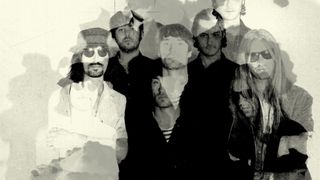Lemmy’s dead. Long live Lemmy. The Hawkwind/Motörhead bass legend haunts every groove of Distance Inbetween, the latest album from Liverpool band The Coral.
What, The Coral? The NME favourites whose jaunty scally melodies brought them recognition in the early 2000s as sort of latter-day Britpoppers? The same Coral whose first four albums were Top 5 hits and whose singles – Goodbye, Dreaming Of You, Don’t Think You’re The First, Pass It On – achieved cuddly mainstream ubiquity, with one of them, 2005’s In The Morning, becoming the most-played track on British radio that year after Beyoncé? That Coral?
Yup, the very same. Still, it’s not as though they’ve never visited the further reaches of the rock-o-sphere: their albums have betrayed the influence of everyone from The Doors to Pink Floyd, Can to Captain Beefheart, while also featuring unexpected elements of doo wop and dub, spaghetti western and barbershop quartets. And they’ve worked with everyone from Geoff Barrow of trip hop pioneers Portishead and experimental outfit BEAK> to John Leckie, production/engineering supremo at the controls for Pink Floyd, Plastic Ono Band, Be-Bop Deluxe, XTC and countless others.
In fact, it was Leckie – having produced The Coral’s 2010 album Butterfly House – who encouraged them to pursue their latest direction.
“Leckie heard us play live,” recalls James Skelly, the band’s guitarist and main songwriter from his home in Hoylake, the seaside town on the Wirral where you can see for the proverbial miles, all the way to Liverpool on one side and Wales on the other. His accent is impenetrable, his speech pattern meandering, just as you’d expect from a member of a crew dubbed ‘Cosmic Scousers’. “He said, ‘It’s like prog punk,’ and he told us that’s what we need to make an album like: prog punk.”
Following the producer’s orders, prog punk was indeed the path they took. Unfortunately, they got lost on the way, unable to find quite the sound they had in their heads.
“We were searching and searching for the sound, and I knew what it was,” says Skelly, recalling the moment he was lost in the metaphorical mist, with no direction home. Suddenly, as though by magic, a sign: “I heard Warrior On The Edge Of Time by Hawkwind, and that was it. I thought, ‘That’s what I’m looking for!’ That record inspired our album.”
The ghost of Lemmy?
“Yeah.”
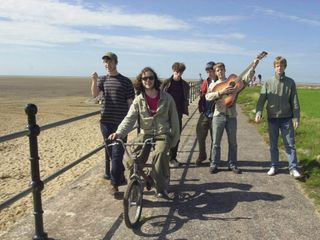
The rest of the band hardly complained when Skelly announced that a 40-year-old Hawkwind album was going to be the pointer towards The Coral’s future. Bassist Paul Duffy, for one, was delighted – albeit in a stoned, laid-back way.
“When James got the songs together, I was thinking, ‘I’ll do some intricate basslines,’” he offers. “And he was like, ‘No, keep it Lemmy!’ And I was like, ‘Oh, go on then.’ It’s definitely the main influence on the album.”
It’s not the only influence, of course. On Distance Inbetween you can tell the Wirral wanderers have been listening to Sabbath and The Stooges, evidently a function of the fact that new guitarist Paul Molloy, who joined in 2015, is a fan of both. You can also detect the imprint of drone and space rock, Krautrock and psych – one track, White Bird, is like Neu! dragging The Byrds down a motorik dirt track, while Million Eyes and Miss Fortune, explains Skelly, “were designed to sound like Harmonium or Neu! playing with Tom Petty & The Heartbreakers”.
It’s a long way from the pleasant melodies of Butterfly House.
“Yeah, if you listen to the last album and then this one,” suggests Skelly, “you might well think, ‘Have they been through the event horizon?’”
I remember someone saying Dave Gilmour had heard of us. Just to be acknowledged by him,
it was like, ‘Fuck! Dave Gilmour’s heard of us!’
Were any hallucinogenics ingested in the making of Distance Inbetween?
“Well,” he muses, “drugs have always been part of being in a band, but… No, not while making the album.”
Is this music to trip out to?
“We’ve always been about the music, not really anything else,” adds Duffy. “It’s something we’ve always enjoyed – jamming out and going a bit heavier. It might be good to trip out to but I’ve never done it myself.”
Have the band never taken acid before going onstage?
“No,” replies the bassist. “Never. I’d like to say we did, but no. We were always quite professional when it came to gigs. We took acid when we were younger, before we did any gigs. The lyrics on our first album [2002’s The Coral] were mostly the result of the trips we had. But no, our gigs were: turn up and play the best you can.”
Perusing the tracklisting of Distance Inbetween – Chasing The Tail Of A Dream, Million Eyes, Holy Revelation – you could be forgiven for assuming they were psychedelically enhanced.
“Yeah, that has always been there with us,” he says of the psych aspect. “But no, we won’t be taking any trips this time round. We’re too old!”
Duffy can hardly believe that The Coral have now been going for 20 years, since forming at school in 1996. He believes the band could have been even bigger than they were, and that they stepped back from the fame brink just in time.
“I couldn’t imagine being super-famous like Noel Gallagher, where you can’t walk down the street without someone shouting at you,” he says. “That would seem a bit scary. I think maybe we made a little bit of a choice not to go there, even if it was subconscious. I like the way we are now, where we can explore different things musically. Being a bit ‘reclusive’ gives us that option and freedom.”
Skelly sees The Coral’s journey as having been somewhat bumpy.
“It’s a schizophrenic one, I think,” he says, if indeed you can have a bipolar trajectory. He surveys the last two decades. “When we started, everyone was together, you were as one and you had no mortgage or girlfriends – it was just one movement. And then the wheels started to come off around the second album.”
After that, he says, it was “all conflict and turmoil” within the band, from 2003’s Magic And Medicine to 2010’s Butterfly House. It was a period that saw the departure of guitarist Bill Ryder-Jones and the death of their label boss Alan Wills.
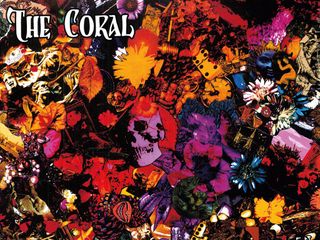
Skelly considers Butterfly House to have been “a full stop. Whereas this,” he says of Distance Inbetween and the new optimism it has created in the Coral ranks, “is a new sentence, a new beginning.”
Skelly notes that 85-90 per cent of the band’s stuff isn’t really like their big hit singles, and believes the new album can form a triptych of their darker, more experimental work with 2004’s Nightfreak And The Sons Of Becker and 2005’s The Invisible Invasion.
Distance Inbetween finds The Coral “a committed band again: everyone’s on the same page, which I think is quite similar to the first album”. Skelly talks in terms of a feeling of resistance within the band and the music – a toughness, a resilience, and a determination to have an impact.
There will certainly be a lot of highly regarded musicians cocking an eye to their latest sound: Robert Plant, to name but one. As a member of the Music Producers Guild, he helped vote Butterfly House UK Album of the Year. Jimmy Page, too, is a fan, as is David Gilmour.
“I remember someone saying Dave Gilmour had heard of us,” recalls Duffy. “He said, ‘These lads are into a lot of the same things we were into, and you can hear that’ – that was nice to hear. Just to be acknowledged by him, it was like, ‘Fuck! Dave Gilmour’s heard of us!’”
Lemmy might have something dry or caustic to say about the more poetic imagery on Distance Inbetween, with its sense of travel, mystical wonder and science fiction fantasia. Skelly brought his love of the output of comic book writer Alan Moore and sci-fi visionary Michael Moorcock, and American road movies such as Two-Lane Blacktop (you can imagine the album soundtracking a road trip across Merseyside, staking a claim to some of that US mythos), to bear on his writing this time.
“It’s just imagination to me,” he says of his use of far-out imagery to describe personal reality, “but within that you can speak about the truth in a way. Something like [comic book] Swamp Thing woke me up to more things going on in the world than any episode of Question Time.”
If it’s possible to have a ‘prog’ conversation, it’s with The Coral. One minute Duffy is talking about the band’s love of Goblin, the Italian progressive rockers behind horror soundtracks Dawn Of The Dead and Suspiria, the next Skelly is embarking on a circuitous monologue taking in Distance Inbetween as a concept album concerning a haunted fairground, crossing dimensions and tapping into prehistory. Then he gets all contemporary and apocalyptic on Prog’s ass.
“The thing is, what you’re dealing with is pure evil,” he contends of Distance Inbetween and the darker currents running through it that reflect a new dread across the globe. “You’re dealing with something other‑worldly, like a monster.”
What exactly does he mean by that? The Four Horsemen?
“That’s the idea,” he says. And before you file this under the paranoid ramblings of a stoner, he starts railing against David Cameron.
“We’re at the level where the Prime Minister can bum a pig and people will still vote for him,” he says.
Well, Prog ventures, all humans have the potential for debauchery…
“I know,” he exclaims passionately. “I certainly do.”
This all sounds very dark and troubling. Luckily, there’s a new Coral album to save the day. Even if it is dark and troubling. What do they think long-term Coral fans will make of it and its speaker-blowing biker rock? Opening track Connector sounds like a Harley revving into the red…
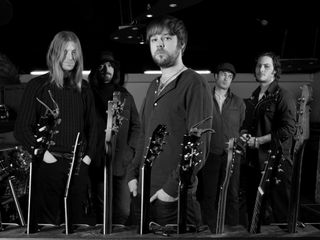
“We wanted to make an album for our fanbase,” considers Duffy while Skelly believes the band’s shift from bright and bouncy to heavy and intense does have precedents.
“You could say the same about Bruce Springsteen going from Dancing In The Dark to Wreck On The Highway,” he posits. “Or The Beatles from Love Me Do to Revolution No 9. We were trying to do something heavier this time, but we didn’t want it to be straightahead rock or a cliché.”
Distance Inbetween is at once futuristic and primitive, with a healthy degree of violent energy. In the nicest possible way, it sounds like the work of people you’d cross the road to avoid.
“Oh good, yeah,” assents Duffy. “That’s the vibe we were going for.”
That bike-chain-wielding homicidal maniac vibe?
“I hope so, yeah,” he chuckles. “That’d be great. Everything’s a bit weak at the moment. This is definitely the right move for us, musically, because everyone expects a really chilled-out album from The Coral and we’ve gone a bit harder. We’ve chucked the acoustics out the window. We just wanted to give music a bit of balls again.”
All well and good, but what do they think Lemmy himself would make of Distance Inbetween?
“I hope he’d like it,” Duffy says, then reconsiders and laughs. “He’d probably slate it, though: ‘Oh, it’s bloody taking the piss out of us!’”
Distance Inbetween is out now on Ignition. See The Coral’s website for details.
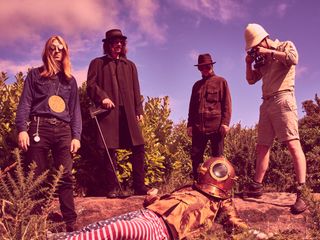
YOUR SHOUT
Inspired by Hawkwind, drone, Krautrock, psych and more? Just how prog are
The Coral then?
“Very much so. Goodbye from their debut is like an early Floyd workout condensed into three minutes.”
Rich Goodall
“Bye.”
Nicholas John Payne
“Probably now they are, but when I saw them in concert a few years ago, they weren’t prog at all. Maybe Doors-y.”
Max Brighel
“Great band always liked them. Looking forward to hearing their new one”
Mr. Dibs
“Thought they were an indie pop band?”
Tom Archer
“I’ve never given them the time of day, but going by the supposed infuences for this new album I think I might check them out. Prog’s all about open-mindedness after all. Isn’t it?”
Nick Evershaw
“Only ever saw them on TV once. Thought they were awful.”
Colin Patterson
“I saw Anathema tweeting about them the other day so checked something out online. I agree. New stuff veering towards prog.”
Karen Shelton
“Id rather hear newer bands trying something different rather than tired old prog bands copying the sounds of prog gone by!”
Ed Perry
“Never heard of them…”
Ralph Dickenson
“Not prog!”
David Yardsley
“Why do you do this feature? I don’t want to hear about new bands!”
Mick Colton
“I love them. Always said there was something more to them than boring indie rock.”
Jane Etherington
“Nope!”
Joel Pickford
“Not interested.”
Clive Keely
“I like what I’ve heard of the newer stuff. Not so sure about the early albums though.”
Martin Sharrock
“I think they’re a good band. Not certain I’d call them prog, though.”
Mary Smith
“The new album’s certainly progressive. More prog than most of the bands proclaiming to be prog these days!”
Mike Keeting
“Well they’re from Liverpool and they don’t sound like The Beatles. That’s progression of a sort!”
Terry Ford
